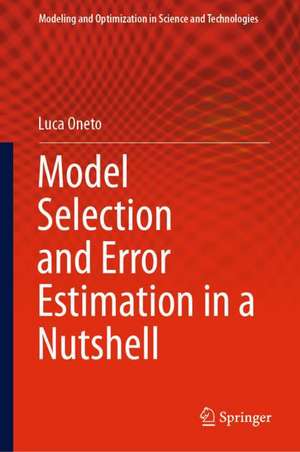Model Selection and Error Estimation in a Nutshell: Modeling and Optimization in Science and Technologies, cartea 15
Autor Luca Onetoen Limba Engleză Hardback – 25 iul 2019
| Toate formatele și edițiile | Preț | Express |
|---|---|---|
| Paperback (1) | 638.21 lei 6-8 săpt. | |
| Springer International Publishing – 14 aug 2020 | 638.21 lei 6-8 săpt. | |
| Hardback (1) | 593.27 lei 38-44 zile | |
| Springer International Publishing – 25 iul 2019 | 593.27 lei 38-44 zile |
Din seria Modeling and Optimization in Science and Technologies
- 24%
 Preț: 700.63 lei
Preț: 700.63 lei - 15%
 Preț: 660.68 lei
Preț: 660.68 lei - 20%
 Preț: 1061.40 lei
Preț: 1061.40 lei - 20%
 Preț: 656.19 lei
Preț: 656.19 lei - 15%
 Preț: 492.95 lei
Preț: 492.95 lei - 15%
 Preț: 641.85 lei
Preț: 641.85 lei - 20%
 Preț: 1160.73 lei
Preț: 1160.73 lei - 18%
 Preț: 1114.52 lei
Preț: 1114.52 lei - 20%
 Preț: 1177.91 lei
Preț: 1177.91 lei - 20%
 Preț: 646.12 lei
Preț: 646.12 lei - 18%
 Preț: 965.97 lei
Preț: 965.97 lei - 20%
 Preț: 1005.46 lei
Preț: 1005.46 lei - 20%
 Preț: 1280.84 lei
Preț: 1280.84 lei - 15%
 Preț: 647.59 lei
Preț: 647.59 lei - 18%
 Preț: 1124.30 lei
Preț: 1124.30 lei - 18%
 Preț: 965.34 lei
Preț: 965.34 lei
Preț: 593.27 lei
Preț vechi: 741.59 lei
-20% Nou
Puncte Express: 890
Preț estimativ în valută:
113.52€ • 118.84$ • 93.93£
113.52€ • 118.84$ • 93.93£
Carte tipărită la comandă
Livrare economică 01-07 aprilie
Preluare comenzi: 021 569.72.76
Specificații
ISBN-13: 9783030243586
ISBN-10: 3030243583
Pagini: 125
Ilustrații: XIII, 132 p. 62 illus.
Dimensiuni: 155 x 235 mm
Greutate: 0.39 kg
Ediția:1st ed. 2020
Editura: Springer International Publishing
Colecția Springer
Seria Modeling and Optimization in Science and Technologies
Locul publicării:Cham, Switzerland
ISBN-10: 3030243583
Pagini: 125
Ilustrații: XIII, 132 p. 62 illus.
Dimensiuni: 155 x 235 mm
Greutate: 0.39 kg
Ediția:1st ed. 2020
Editura: Springer International Publishing
Colecția Springer
Seria Modeling and Optimization in Science and Technologies
Locul publicării:Cham, Switzerland
Cuprins
Introduction.- The “Five W” of MS & EE.- Preliminaries.- Resampling Methods.- Complexity-Based Methods.- Compression Bound.- Algorithmic Stability Theory.- PAC-Bayes Theory.- Differential Privacy Theory.- Conclusions & Further Readings.
Notă biografică
Luca Oneto was born in Rapallo, Italy in 1986. He received his BSc and MSc in Electronic Engineering at the University of Genoa, Italy respectively in 2008 and 2010. In 2014 he received his PhD from the same university in the School of Sciences and Technologies for Knowledge and Information Retrieval with the thesis ``Learning Based On Empirical Data''. In 2017 he obtained the Italian National Scientific Qualification for the role of Associate Professor in Computer Engineering and in 2018 he obtained the one in Computer Science. He worked as Assistant Professor in Computer Engineering at University of Genoa from 2016 to 2019. In 2018 he was co-founder of the spin-off ZenaByte s.r.l. He is currently Associate Professor in Computer Science at University of Pisa with particular interests in Statistical Learning Theory and Data Science. Besides being an editorial board member of the book series Modeling and Optimization in Science and Technologies he is also co-author of the textbook Introduction to Digital Systems Design (Donzellini et al., Springer, 2019).
Textul de pe ultima copertă
How can we select the best performing data-driven model? How can we rigorously estimate its generalization error? Statistical learning theory answers these questions by deriving non-asymptotic bounds on the generalization error of a model or, in other words, by upper bounding the true error of the learned model based just on quantities computed on the available data. However, for a long time, Statistical learning theory has been considered only an abstract theoretical framework, useful for inspiring new learning approaches, but with limited applicability to practical problems. The purpose of this book is to give an intelligible overview of the problems of model selection and error estimation, by focusing on the ideas behind the different statistical learning theory approaches and simplifying most of the technical aspects with the purpose of making them more accessible and usable in practice. The book starts by presenting the seminal works of the 80’s and includes the most recent results. It discusses open problems and outlines future directions for research.
Caracteristici
Reviews the main approaches to problems of model selection and error estimation Simplifies most of the technical aspects focusing on the applicability of the approaches Presents the intuitions behind the methods, the formalism, and practical algorithms
